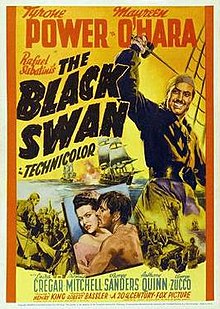The Black Swan
The Black Swan (film)
The Black Swan is a 1942 American swashbuckler Technicolor film directed by Henry King, based on a novel by Rafael Sabatini, and starring Tyrone Power and Maureen O'Hara.[3][4] It was nominated for a total of three Academy Awards, and won the award for Best Cinematography, Color. It was based on the 1932 novel of the same title by Rafael Sabatini.
| The Black Swan | |
|---|---|
 Theatrical release poster | |
| Directed by | Henry King |
| Produced by | Robert Bassler |
| Screenplay by | Ben Hecht Seton I. Miller |
| Based on | The Black Swan by Rafael Sabatini |
| Starring | Tyrone Power Maureen O'Hara |
| Music by | Alfred Newman |
| Cinematography | Leon Shamroy |
| Edited by | Barbara McLean |
| Distributed by | Twentieth Century-Fox Film Corporation |
| Release date |
|
| Running time | 85 minutes |
| Country | United States |
| Language | English |
| Budget | $1,493,800[1] |
| Box office | $3.5 million (US rentals)[2] $5,727,000 (worldwide)[1] |
This was the final film of silent star Helene Costello.
PlotEdit
After England and Spain make peace, notorious pirate Henry Morgan (Laird Cregar) decides to reform. As a reward, he is made Governor of Jamaica, with a mandate to rid the Caribbean of his former comrades, by persuasion or force if necessary. He replaces the former governor, Lord Denby (George Zucco), but is not trusted by either the lawful residents or the pirates.
Captain Jamie Waring (Tyrone Power) and his lieutenant, Tom Blue (Thomas Mitchell), reluctantly give up their "trade" out of friendship for Morgan, but others of the Pirate Brotherhood, such as Captain Billy Leech (George Sanders) and Wogan (Anthony Quinn), refuse to change.
Meanwhile, Waring takes a liking to Denby's daughter, Lady Margaret (Maureen O'Hara), who happens to be inconveniently engaged to an English gentleman, Roger Ingram (Edward Ashley). As it turns out, her fiancé is secretly providing information about ship sailings to the unrepentant pirates.
The Jamaican assembly is in an uproar about the rogue pirates, so Morgan sends Jamie to track down Leech but he fails due to Ingram's help. The Jamaican assembly votes to impeach Morgan, and Ingram announces he and Margaret will sail to England to inform the King.
Morgan orders Jamie to capture Leech in order to head of the Jamaican assembly vote against him. Jamie prepares to follow Morgan's orders, but as he doesn't want Margaret to marry Ingram he goes by her house and takes her and sails off.
The pirate fleet with the Black Swan shows up sailing hard behind him, and Jamie's ship is captured by Leech. Jamie pretends that he has run away to join Leech and marry Margaret. Margaret reluctantly goes along with the ruse. Morgan hears of Jamie's "betrayal" and heads off to catch them.
Leech discovers the marriage between Margaret and Jamie is a sham and captures Jamie. Leach takes Jamie's ship to where the other ships are waiting and showers them with cannon fire. However, during the fight, Jamie escapes and manages to kill Leech in a duel, as Morgan storms aboard.
Morgan is inclined to hang Jamie because he abducted Margaret but she declares that she accompanied him of her own free will. By now they have genuinely fallen in love and they kiss.
CastEdit
Tyrone Power as Jamie Waring
Maureen O'Hara as Lady Margaret Denby
Laird Cregar as Sir Henry Morgan
Thomas Mitchell as Tom Blue
George Sanders as Captain Billy Leech
Anthony Quinn as Wogan
- George Zucco as Lord Denby
ProductionEdit
O'Hara recalled that it was "everything you could want in a lavish pirate picture: a magnificent ship with thundering cannons; a dashing hero battling menacing villains ... sword fights; fabulous costumes ...". She found it exhilarating working with Power, who was renowned for his "wicked sense of humor".[5] O'Hara grew very concerned about one scene in the picture in which she is thrown overboard in her underwear by Power, and sent a warning letter home to Ireland in advance.[6] She refused to take her wedding ring off in one scene which resulted in screen adjustments to make it look like a dinner ring.[7] Though the film was praised by critics and is seen as one of the period's most enjoyable adventure films, the critic from The New York Times thought O'Hara's character lacked depth, commenting that "Maureen O'Hara is brunette and beautiful—which is all the part requires".[8]
ReceptionEdit
The film was a huge hit and made a profit of $2,366,300.[1] The review aggregator Rotten Tomatoes reported that 80% of critics have given the film a positive review based on 5 reviews, with an average rating of 7/10.[9]
AwardsEdit
The film won an Academy Award and was nominated for two more:[10]
- Won
- Best Cinematography (Leon Shamroy)
- Nominated
- Best Visual Effects (Fred Sersen, Roger Heman Sr., George Leverett)
- Best Original Score (Alfred Newman)
DVD releaseEdit
The DVD version of the film contains commentary by Maureen O'Hara with film critic Rudy Behlmer.
ReferencesEdit
- ^ a b c Mank, Gregory William (2018). Laird Cregar: A Hollywood Tragedy. McFarland.
- ^ Aubrey Solomon, Twentieth Century-Fox: A Corporate and Financial History Rowman & Littlefield, 2002 p 219
- ^ Variety film review; October 21, 1942, page 8.
- ^ Harrison's Reports film review; October 24, 1942, page 171.
- ^ O'Hara & Nicoletti 2005, p. 106.
- ^ Malone 2013, p. 43.
- ^ Malone 2013, p. 44.
- ^ "The Black Swan". The New York Times. 24 December 1942. Archived from the original on 30 October 2015. Retrieved 30 September 2015.
- ^ "The Black Swan (1942)". Rotten Tomatoes. Fandango. Retrieved 2020-03-20.
- ^ "The 15th Academy Awards (1943) Nominees and Winners". oscars.org. Retrieved 2013-06-22.
External linksEdit
| Wikimedia Commons has media related to The Black Swan (1942 film). |







Comments
Post a Comment